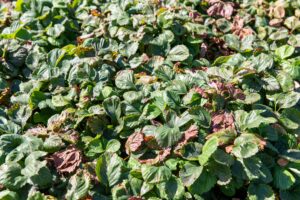The heat is on: how to combat summer heat stress in fruit
10th August 2023
Hortifeeds agronomist, Mike Wainwright, provides some advice that growers can easily incorporate into current growing practices to reduce summer heat stress.

Strawberry leaves affected by the temperature during summer
The summer of 1976 has often been romanticised as the epitomy of a wonderfully hot English summer. As an impressionable child at the time, my rose-tinted memories are filled with endless sunshine, trips to the beach and ice creams.
However, the legacy of 1976 for the countryside and our farmers was quite different. It has been shown that hundreds of thousands of trees were so weakened by the drought that they either died straight away, or in the following few years.
For farmers, the drought either caused crops to fail altogether or drastically reduced yields. Although the issue of climate change wasn’t known about at the time, the frequency of very hot summers has greatly increased in the intervening years.
Increased variability in weather conditions
A key effect of climate change that we are already seeing in the UK is increased variability in weather conditions. The constantly changeable nature of our weather means we never know when extreme heat will occur until it’s often too late to react and alter crop responses.
With the recent monumental increases in productions costs, from water and fertilisers to labour and transport, margins are becoming ever tighter, and the difference between relative success and failure is becoming ever smaller. Ensuring crop watering and nutrition are optimised during variable weather conditions is vital to achieve the efficiencies every grower needs while producing the high quality crops that the retailers (and consumers) demand.

Water – a valuable and finite resource
The costs of providing sufficient irrigation have greatly increased over recent years, so it’s now much better recognised as a valuable and finite resource. Wetting agents have been available to aid water use efficiency for container grown crops for a long time, but the benefits of these are becoming increasingly recognised during heat stress conditions, including their use on irrigated soil-grown crops.
The savings in water and fertiliser applications, from using valuable resources as effectively as possible to ensuring that irrigation is distributed evenly around the crop, can far outweigh the costs of application. The award-winning environmentally-friendly wetting agent HortiHydrate Bio is derived from sustainable ingredients and increases the speed of absorption and spread of irrigation water to where it’s needed around the roots of plants.
Introduce biostimulants to mitigate effects of heat stress
During periods of extreme summer heat, plants respond to the stress by closing stomata and increasing electrolyte concentration in cells to prevent damage. The effect of these changes is to effectively ‘shut down’ growth, which will result in lower yield and quality. Regular use of the biostimulant HortiBoost has been shown to help mitigate the effects of heat stress. Several growers, after trialling HortiBoost during the summer of 2022, found it so effective they have decided to use it as a regular input throughout their production programmes.
HortiBoost contains seaweeds and amino acids, as well as humic and fulvic acids. The combination of these stress protective constituents provide benefits far greater than applying any one of the components individually.
There are 20 essential amino acids manufactured and used by plants that are found in the product. These are used as the building blocks in the synthesis of the many proteins needed for healthy growth and development. Around half of these amino acids also have specific roles involved in heat and drought stress protection.
Provision of amino acids in HortiBoost helps to maintain plant growth responses, even during stress conditions, preventing loss of yield and quality. Applying biostimulants such as this frequently at rates as low as 2-litres/ha, ‘little and often’, and tank mixing with other inputs including fungicides or insecticides allows for efficient inputs throughout the stress danger period.
Importance of calcium
Certain amino acids found in HortiBoost, such as glycine and glutamic acid, stimulate root cells to open calcium ion channels, allowing calcium to be taken up faster than by normal osmosis alone.
While calcium is understood by fruit growers to be a vital component in the formation of fruit cell structure, it’s also important to realise that the cell wall strengthening properties provided by calcium apply equally to leaves. Calcium forms the ‘glue’ that binds cell walls together, strengthening plant tissues against temperature stress, so optimising cell calcium content will help in providing resilience. Calcium is unlike most other plant nutrients in being transported. Under stress and intermittent drought conditions, the flow of nutrients to the leaves can be insufficient and cause ‘induced’ calcium deficiency at leaf margins.
Amētros, from Plant Impact, contains calcium along with patented CaT technology which helps to mobilise calcium and increase its concentration in the cells where it is needed most, improving resilience to heat stress conditions, as well as increasing fruit quality and shelf life.
With the fickle nature of the weather in Britain being as it is, there’s a chance you will be reading this article while sheltering from summer rain, however if we can learn anything from recent summers, it’s that it’s always best to be prepared for extreme heat events and take steps to mitigate the effects as much as possible.
